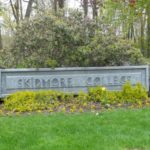The 5 HBCUs in Virginia: Which is Right for You?
What’s Covered:
Historically Black Colleges and Universities (HBCUs) were created in the 19th century to provide higher educational opportunities for African Americans—the first HBCU was Cheyney University in Pennsylvania, which was founded in 1837. Today, the number of HBCUs in the U.S. totals over 100 and while they represent a small fraction of the colleges and universities in the country, they play an overwhelming role in the higher education of Black students. HBCUs make up just 3% of the country’s colleges and universities, yet they enroll 10% of all African-American students and produce almost 20% of all African-American graduates.
The state of Virginia is home to five HBCU’s: Hampton University, Norfolk State University, Virginia State University, Virginia Union University, and Virginia University of Lynchburg.
The 5 HBCUs in Virginia
1. Hampton University
Location: Hampton, Virginia
Acceptance Rate: 44%
Undergraduate Enrollment: 3,063
From humble beginnings, Hampton University is one of a small number of HBCUs in Virginia, but is one of the top HBCUs in the nation. Hampton’s first class of about 20 students was taught under an oak tree. Just a few years later, the first time the Emancipation Proclamation was read in the South would be under the very same tree. That oak tree stands today—known as the “Emancipation Oak” and is considered one of the great trees of the world by the National Geographic Society.
Students from across the country come to Hamilton. Hampton’s campus is home to students representing 49 states and 35 territories and nations attending one of the university’s seven schools:
- James T. George School of Business
- School of Engineering and Technology
- Scripps Howard School of Journalism and Communications
- School of Liberal Arts and Education
- School of Nursing
- School of Pharmacy
- School of Science
Popular majors include business, psychology, biology, corporate communications, liberal arts and humanities, broadcast journalism, and kinesiology and exercise science.
2. Norfolk State University
Location: Norfolk, Virginia
Acceptance Rate: 90%
Undergraduate Enrollment: 4,600
Norfolk State University (NSU) also grew from modest beginnings, at first enrolling 85 students and with classes held in three second-floor rooms at the YMCA. To say NSU has grown up since its founding in 1935 is an understatement—today, the school sits on a 134-acre campus near downtown Norfolk and offers 30 undergraduate programs ranging from accounting to tourism and hospitality management.
At the heart of the Norfolk State University experience are its core values:
- Excellence: Foster a culture of excellence in every facet of the university.
- Student-Centered: Students are the top priority.
- Diversity and Inclusiveness: Foster a multicultural campus that respects all people, cultures, ideas, beliefs, identities, socio-economic backgrounds, and perspectives.
- Integrity and Civility: Everyone is to be held accountable for their actions and to engage in honest, ethical behavior, and treat others with respect and civility.
- Engagement: Influence local and global communities by promoting educational attainment, cultural enrichment, and economic development.
- Pride: Honor the university’s history and legacy.
- Financial Empowerment: Pursue expanded and more diversified revenue streams.
3. Virginia State University
Location: Petersburg, Virginia
Acceptance Rate: 91%
Undergraduate Enrollment: 3,900
Founded in 1882, Virginia State University (VSU) has the distinction of being the U.S.’s first fully state-supported four-year institution of higher learning for Black Americans. In addition to being one of the five HBCUs in Virginia, VSU is also just one of two land-grant universities in the state.
VSU’s 231-acre campus is home to six colleges:
- The College of Agriculture
- The Reginald F. Lewis College of Business
- The College of Education
- The College of Engineering and Technology
- The College of Humanities and Social Sciences
- The College of Natural and Health Sciences
Through its six colleges, VSU offers 36 undergraduate degrees ranging from agriculture to visual arts. Speaking of agriculture, the school is home to a 412-acre agriculture research facility.

4. Virginia Union University
Location: Richmond, Virginia
Acceptance Rate: 44%
Undergraduate Enrollment: 1,100
Virginia Union University (VUU) dates back to 1865 when it was founded to provide educational opportunities to newly emancipated enslaved people. VUU celebrates its African-American Heritage, looks back on its past, and focuses on the future. VUU’s mission is to:
- Provide an intellectually challenging and enriching environment for learning
- Empower students with strong moral values and set them up for success
- Develop scholars, leaders, and lifelong learners
VUU offers 22 majors ranging from biology to theatre through its four schools:
- Sydney Lewis School of Business
- Evelyn R. Syphax School of Education, Psychology and Interdisciplinary Studies
- School of Humanities & Social Sciences
- School of Mathematics, Science & Technology
VUU awards more than 250 undergraduate degrees annually.
5. Virginia University of Lynchburg
Location: Lynchburg, Virginia
Acceptance Rate: N/A
Undergraduate Enrollment: 200
The smallest of the HBCUs in Virginia, Virginia University of Lynchburg (VUL) provides a foundation of liberal arts and Christian education to its students. The school has deep religious roots—it was founded in 1886 as the Lynchburg Baptist Seminary and renamed in the 1890s as the Virginia Seminary. The school was reincorporated as the Virginia Theological Seminary and College in 1900 and, in 1962, became the Virginia Seminary and College. It wasn’t until 1996 that VUL took its current name.
VUL’s motto is “Self-help and Interdependence” and is committed to offering an educational pathway to students who may not have the chance to attend a larger university. Degrees offered at VUL include an Arts in Religious Studies B.A., Business Administration B.A., and an Organizational Management B.A.
What are Your Chances of Acceptance?
Your odds of acceptance at an HBCU in Virginia is largely dependent on which school you apply to—some, such as Hampton, have low acceptance rates when compared to others, like Virginia State University. Your chances will also coincide with the strength of your profile, as your personal chances of acceptance may be higher or lower than the listed admissions rates.
CollegeVine’s free admissions calculator can help you better understand your odds at an HBCU in Virginia. It uses a host of factors like GPA, test scores, and extracurricular activities to estimate your odds of admissions and highlight areas in need of improvement.



